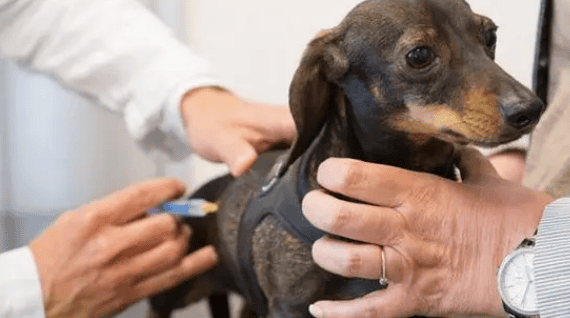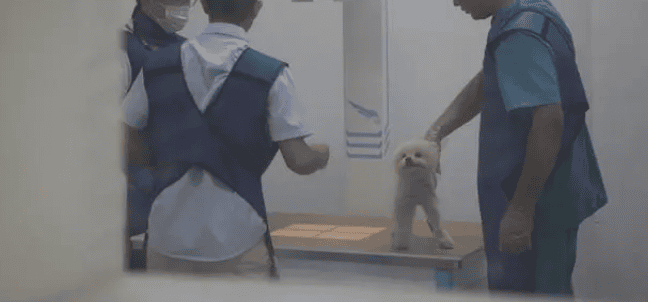01
Immunization
Vaccination of pet dogs is an important measure to ensure the health of dogs. The first vaccination for dogs is 6 weeks after birth. The vaccination content is five-part vaccine (which can include canine distemper, parvovirus, rabies, parainfluenza virus and pneumococcus, etc.). The second vaccination is given 21 to 28 days after the first vaccination. The corresponding compound vaccine needs to be selected for the second vaccination. It is recommended not to let the dog come into contact with other unvaccinated dogs during this process to avoid infection.
After completing two basic immunizations, dogs should receive a compound vaccine once a year and a rabies vaccine in accordance with the rabies prevention requirements. It is recommended that the injection be given on the anniversary of the first vaccination. It should be noted that vaccination is not a panacea. Some diseases require re-examination, such as rabies, pneumonia, etc. It is recommended that dog owners take their pets to regular animal hospitals for examination and diagnosis on a regular basis. At the same time, according to the actual situation and living environment of the dog, a personalized vaccination plan can be customized based on the recommendations of the veterinarian.
02
Parasite prevention and control
Pet dog parasite prevention and control is an important part of the daily health care of pet dogs, which is to prevent the infection of parasites in the dog's body. Dogs may be infected with parasites after birth. It is recommended that dogs be dewormed before they are 3 months old, and every 3 to 6 months thereafter. Pay attention to regular bathing and cleaning, especially the dog’s private parts. Dogs often lick their vulva and anus. These areas are the main places for parasites to live. Regular cleaning and disinfection can effectively prevent the growth of parasites.
Pay attention to your dog’s food hygiene. Pet food and drinking water can easily become a breeding ground for parasites, so keep food utensils clean and hygienic, and do not allow your pet dog to eat raw meat, raw fish and other foods that are susceptible to parasites. Go to a regular animal hospital for regular examination and diagnosis, and carry out deworming and drug prevention according to the doctor's recommendations. The prevention and control of dog parasites is not only a matter for the dog, but also requires attention to the hygiene of people and the environment. Family members should perform personal hygiene regularly, pay attention to cleaning pet supplies at home, and maintain environmental hygiene. This can effectively prevent reinfection of parasites in dogs.

03
Diet and nutrition
Pets Dog diet and nutrition are important parts of the daily health care of pet dogs. Pay attention to the reasonable combination of food. Pet dogs need a variety of nutrients such as protein, fat, carbohydrates, vitamins and minerals. You can choose commercially available food specifically for pet dogs, or you can develop a reasonable diet plan based on the individual conditions of your pet dog. The amount of food your pet dog eats should be determined based on factors such as weight and age. Do not give your pet dog too much or too little food to avoid obesity or physical weakness. Giving your pet dog a regular and quantitative diet every day can help your pet dog develop good eating habits and avoid behaviors such as overeating or picky eating.
Pet dogs need to drink water at any time. Make sure that the pet dog has enough water to drink. The water must be cleaned and changed regularly. Pet dog food utensils should be washed frequently, disinfected regularly, and kept hygienic and clean. Food variety. In the dog's diet, the diversity of food should be increased, which can provide the pet dog with more comprehensive nutrients and enrich the taste of the pet dog's diet. Different breeds of pet dogs have different dietary requirements, and age and physiological status will also affect dietary requirements. When formulating your dog's diet plan, you should consult your veterinarian or pet diet expert for advice to ensure your dog gets adequate nutrition and a healthy lifestyle.
04
Movement and exercise
It is also very important for pet dogs to exercise. Walk your dog regularly, at least twice a day, for more than 20 minutes each time. Walking the dog can allow the pet dog to perform moderate aerobic exercise and enhance cardiopulmonary function and muscle strength. Regularly participating in outdoor activities and taking your pet dog to play outdoors, such as playing ball, chasing, etc., can allow your pet dog to get more exercise and stimulation. For large breeds that are suitable for swimming, you can take your pet dog swimming. Swimming is a low-impact exercise that causes less damage to joints and muscles.
Pet dogs also need intellectual training, and their intelligence can be improved through intellectual games. Games such as hiding food and finding balls can give pet dogs a certain amount of exercise and stimulation. Different breeds have different exercise needs, and excessive exercise is not allowed to avoid damage to the joints and muscles of the pet dog. The exercise and exercise needs of pet dogs vary depending on individual differences such as dog breed, age, size, etc. Pet owners need to develop a suitable exercise plan for their pet dogs based on specific circumstances. At the same time, be careful to avoid excessive exercise in adverse weather conditions such as high temperature, cold, and humidity.
05
Bathing and Cleaning
It is generally recommended to bathe once a month, and it can be increased or decreased appropriately under special circumstances. Choose toiletries specially designed for dogs, such as shampoo, conditioner, shampoo, toothbrushes, nail clippers, etc. Choose a place with suitable indoor temperature, good ventilation, and sufficient water for bathing. Clean the bathing environment before bathing to ensure that the environment is clean and hygienic.
The bathing process is: first soak the dog's body in warm water to make the dog's body wet. Pour an appropriate amount of shampoo into the palm of your hand, apply it gently on the dog's body, and massage to create a lather. Rinse the shampoo from your dog's body thoroughly to avoid leaving any residue. Apply an appropriate amount of conditioner to the dog's body again and rinse thoroughly. Use a dry towel to dry the dog's body to prevent it from catching a cold. Use nail clippers to trim your dog's nails as needed. Use special ear cleaning solution and cotton swabs to gently wipe your dog's ears, avoiding going deep into the ears. Use a special large toothbrush and toothpaste to clean your pet dog's teeth, and brush your dog's teeth once a day to prevent oral diseases.
06
Safety and Prevention
In order to ensure the safety of dogs, safety protection measures need to be taken. This includes installing fences, door locks, electronic traction, etc. to prevent dogs from running out of the house or getting lost. At home or when going out for activities, pay attention to prevent the dog from suffering accidental injuries, such as falling, being hit by a vehicle, being bitten, etc. When walking your dog, you should use a leash to prevent your dog from running around or attacking other animals or people. Take your pet dog to the veterinarian regularly for vaccination, deworming and physical examination. In addition, clean the dog's environment and daily supplies regularly to keep it clean and hygienic to prevent the spread of disease and the growth of bacteria. In an emergency, it is necessary to master basic first aid measures for pet dogs in advance, such as hemostasis, artificial respiration, etc., in order to handle emergencies in a timely manner.
07
Health Checkup
It is recommended to conduct a comprehensive physical examination once a year so that potential health problems can be discovered and dealt with promptly. Develop a vaccination plan based on your veterinarian's recommendations and factors such as your dog's age, breed, and lifestyle. Check the heart function of your pet dog through auscultation and other examination methods to ensure the health of its cardiovascular system. Blood samples of pet dogs are taken for testing to check whether there are any abnormalities in the blood, such as parasites, viruses, etc.
Check whether the pet dog’s skin is healthy and whether there are skin diseases, fleas, parasites and other problems. Check your dog's oral health to prevent tooth decay and periodontal disease. Check your dog’s ears and eyes to see if they are healthy and free of infection, inflammation, and other problems. Check your pet dog's weight and size to evaluate its diet and nutritional status and develop a corresponding diet plan. Check whether the pet dog's living environment is healthy and safe, and whether there are any dangerous factors. Check whether there are fleas, worms and other parasites on your pet dog, and prevent and treat them in time.

08
Disease prevention
Pet dogs Regular vaccinations against canine distemper, rabies, hepatitis and other diseases are required. Vaccination can improve the immunity of pet dogs and prevent the occurrence of various diseases. Pet dogs need to be regularly rid of internal and external parasites. Internal parasites include roundworms, hookworms, tapeworms, etc., and external parasites include fleas, ticks, etc. Deworming can prevent various diseases caused by parasitic infections in pet dogs.
Controlling a reasonable diet can improve the immunity of pet dogs and prevent the occurrence of various diseases. Pet dogs need to consume sufficient protein, vitamins, minerals and other nutrients while avoiding overfeeding and food poisoning.
The living environment of pet dogs needs to be kept dry and clean to avoid the breeding of bacteria and parasites. Clean your dog's nest and eating utensils regularly to maintain hygiene. Moderate exercise can improve the immunity of pet dogs and prevent the occurrence of various diseases. However, excessive exercise or unreasonable exercise methods may cause your pet dog to be injured or suffer from some diseases. You need to pay attention to the reasonable arrangement of exercise time and method. Pet dogs need regular health check-ups to detect and prevent various diseases early. Regular physical examinations can check the pet dog's weight, physical condition, oral health, ear health, eye health, etc., so that problems can be discovered and dealt with in time.
09
Mental health
You can provide your pet dog with enough exercise and play time, and the dog needs enough exercise and play time to consume it. Their energy increases physical fitness, while also helping them relieve energy and stress. At least 0.5 to 1 hour of exercise is required every day. Give adequate food and water. Dogs need enough food and water to maintain the normal physiological needs of the body. Please be careful not to overfeed your dog, as this can lead to health problems such as obesity.
Provide a safe shelter: Dogs need a clean, safe, and comfortable place to rest and sleep. The shelter should be sized appropriately for the dog's size and should be kept dry and clean. Establish a stable routine: Dogs need a stable, regular routine. For example, feed, walk, play, and sleep at the same time every day. Develop a bond: Developing a bond with your dog makes them feel loved and cared for. Intimacy can be built through mutual proximity, communication, and training. Provide Proper Training and Socialization: Dogs need to receive proper training and socialization to promote their mental and social abilities. You can take dog training classes or take your dog to social events.

 扫一扫微信交流
扫一扫微信交流
发布评论